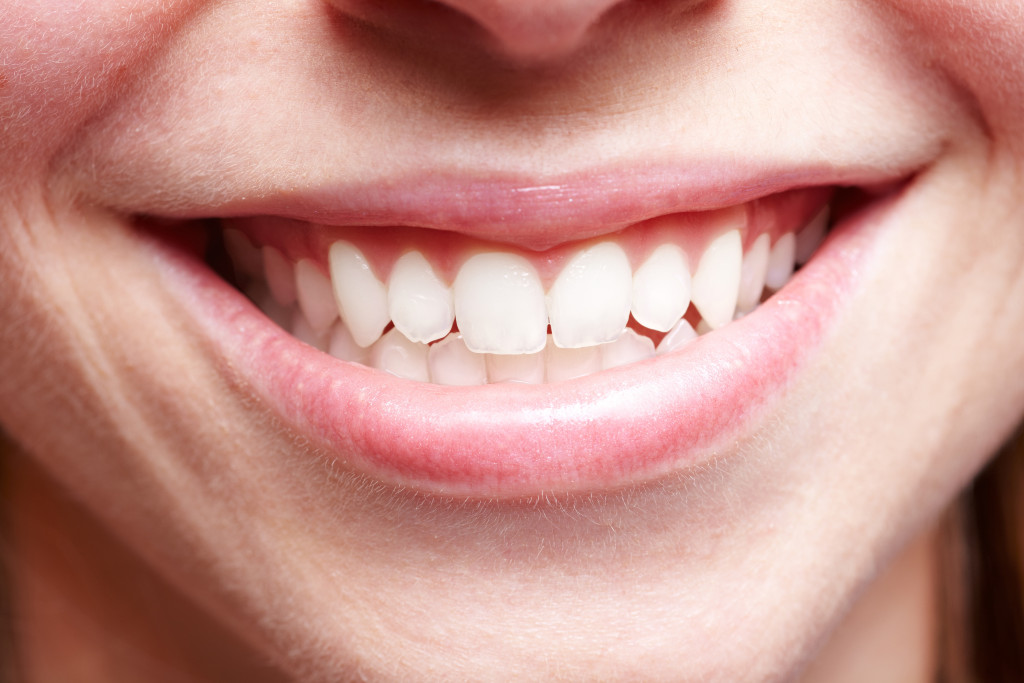- Regular dental visits and good oral hygiene, including brushing and flossing, are essential for healthy gums.
- Using natural mouthwash and avoiding harsh commercial mouthwashes can help avoid gum irritation.
- Dietary choices, like reducing sugary foods and increasing intake of healthy fats, impact gum health.
- Calcium supplements and crunchy fruits/vegetables can strengthen jaw bones and stimulate saliva production.
- Quitting smoking significantly reduces the risk of gum disease and improves oral health.
Oral health is essential to overall well-being, and the gums play a crucial role in maintaining it. Gums are the soft tissue that covers the jaw bones and tooth roots, and healthy gums provide a secure foundation for the teeth. When the gums are unhealthy, it can lead to dental problems like gum recession, tooth loss, bad breath, and even health issues like heart disease. Therefore, keeping your gums healthy is essential for your oral and overall health. This article will discuss some natural ways to maintain healthy gums.
Visit the Dentist Regularly:
One of the most important ways to maintain healthy gums is to visit your local dentist regularly. The American Dental Association recommends that adults visit the dental clinic at least twice yearly for routine check-ups and cleaning. During these appointments, your dentist can detect any potential issues with your gums and take appropriate action before it becomes a serious problem. They can also advise you on natural at-home care for your gums.
Brush Your Teeth Twice a Day:
The golden rule of dental hygiene is brushing your teeth twice daily, for at least two minutes, using fluoride toothpaste. However, brushing is not just for cleaning your teeth; it also helps clean your gums and remove bacteria and food particles that can cause gum disease and decay.
Use a soft-bristled toothbrush and brush gently to avoid damaging the gums. You can also use an electric toothbrush as it may better clean the gums and remove plaque. Some electric toothbrushes also have a timer to help you brush for the recommended two minutes.

Floss Daily:
Flossing is an essential yet often underrated dental practice. It helps remove plaque and food particles between teeth and gumline that brushing may not reach. If left untreated, the food particles can harden into tartar, causing gum inflammation and infection.
Proper flossing technique ensures you’re effectively cleaning between your teeth and gums. Start by using a piece of dental floss about 18 inches long, winding most of it around your middle fingers. Then, use the index finger on one hand and the thumb on the other hand to gently slide the floss between the gaps of the tooth, gliding it around the base near the gums.
Use Natural Mouthwash:
A mouthwash is a great way to freshen your breath and kill bacteria that can cause oral health problems. However, many commercial mouthwashes contain alcohol, which can dry out your mouth and cause irritation. Instead, opt for natural mouthwashes that contain ingredients like tea tree oil, aloe vera, and eucalyptus oil, which have antibacterial and anti-inflammatory properties.
Beware of the Foods You Eat:
The foods you eat can directly affect your gums and teeth. The ingredients in certain foods can cause gum inflammation and infection, while other foods benefit oral health. Here are some tips:
Avoid sugary and acidic foods
Many sugary and acidic foods can damage both your teeth and gums. Foods such as candy, cake, soda, and citrus fruits are high in sugar or acid levels and can cause gum irritation. If you do indulge in these foods, make sure to brush and floss immediately afterward.
Eat more healthy fats
Healthy fats from fish, nuts, avocado, and olive oil help protect the soft tissues of your mouth by providing essential nutrients. These foods can also help reduce inflammation and improve the overall health of your gums.
Take calcium supplements
If you don’t get enough calcium from your diet, consider taking a supplement. Calcium helps strengthen the bones in your jaw, which supports healthy gums and teeth. But talk to your doctor before taking any supplements to make sure it’s right for you.

Eat crunchy fruits and vegetables
Crunchy fruits and vegetables help stimulate saliva production, promoting good oral health by washing away food particles and bacteria. Fruits and vegetables such as apples, celery, carrots, and broccoli are great for your gums.
Eat probiotic-rich foods
Probiotics are beneficial bacteria that help maintain a healthy balance in the gut. Eating probiotic foods such as yogurt, sauerkraut, miso, and kimchi can also promote good dental health by reducing bacteria in the mouth.
Quit Smoking:
Smoking is one of the most significant risk factors for gum disease and tooth loss. It reduces blood flow to the gums, making them more susceptible to infection and inflammation. Aside from the health risks, quitting smoking can improve your breath and oral health.
Maintaining healthy gums is essential for your overall health; the good news is it’s not difficult. These natural tips can help keep your gums healthy and strong for years. Consider seeking advice from experts such as a dentist or nutritionist if you have any questions about how to best care for your oral health. Additionally, eat a balanced diet, drink plenty of water, and get enough rest for optimal well-being. With the right lifestyle practices, you can keep your gums healthy and your smile shining!



